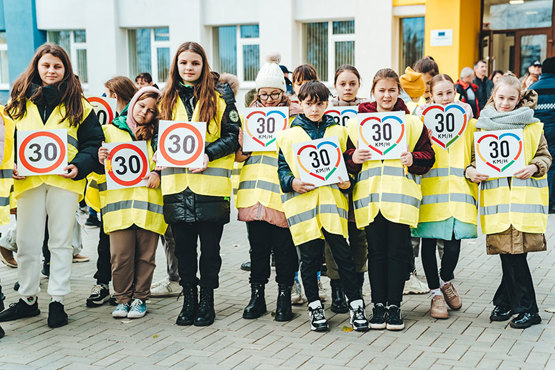Moldova launches five-year National Road Safety Programme, supported by FIA Foundation partners

Moldova has launched a new National Road Safety Programme 2025-2030, developed with technical support from FIA Foundation partners EASST and the Automobile Club of Moldova (ACM).
The Programme aims to halve road deaths across Moldova by 2030, with action implemented by the Ministry of Infrastructure and Regional Development. Areas of focus include strengthening road safety management capacity, improving road safety infrastructure, enhancing vehicle safety systems, educating road users, strengthening law enforcement capacity, and improving post-crash response and care. Strategic safety elements are aimed at protecting vulnerable road users and encouraging modal shift towards more sustainable transport options, including safe cycle lanes, public transport development, traffic calming measures, and modernised, accessible junctions and crossings.
In total, the action plan includes 62 specific targets, including capacity building, safer infrastructure, routine vehicle inspections, 30km/h school zones, and improved data collection.
Moldova has already made significant strides in road safety, achieving a 48% reduction in road traffic during the first UN Decade of Action for Road Safety 2011-2020. The rate of road casualties in the country, however, remains significantly higher than the EU average, and in the past year, death rates have risen more than 5%.
The National Road Safety Programme represents a firm and decisive step toward a Safer System in Moldova, one that protects all road users and supports financial and economic development over the next five years.
Corrine Vibert, EASST Director of Communications, MEL, and Inclusion, said: “This new National Road Safety Programme demonstrates Moldova’s ongoing commitment to improving road safety. We were proud to be part of the process in developing this document, and we are delighted that the Government of Moldova have approved and adopted so many specific targets which prioritise children’s safety and sustainable mobility, among many other areas. This will go a long way towards achieving their target of a 50% reduction in road casualties by 2030.”
The development of the National Road Safety Programme was supported by the World Health Organisation (WHO), the United Nations Development Programme (UNDP) and the United Nations Children’s Fund (UNICEF) with technical support from EASST and the Automobile Club of Moldova (ACM).



